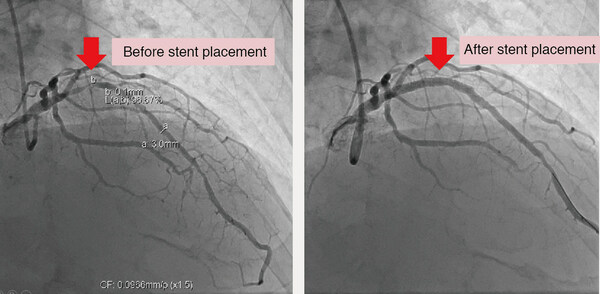TAICHUNG, Taiwan, April 2, 2024 /PRNewswire/ -- The treadmill exercise test (TET) is an important tool for diagnosing coronary artery disease (CAD), but limited by time spent for the manual interpretation of a dozen charts and the challenges in identifying minor deviations. Traditionally, manual interpretation shows only 40%-50% accuracy rate. To address this issue, China Medical University Hospital (CMUH) AI Center successfully developed the "Treadmill Exercise Test AI-Assisted Interpretation System" which was trained with nearly a thousand treadmill ECG, in patients with coronary arterystenosisover 70% shown on their coronary angiography. Further using a deep learning model, the AI program only needs to acquire treadmill ECG at three time points to keep track of the changes from resting to a physically active state. The program also utilizes ten measured features and two derived features including maximal work output and peak heart rate to determine the severity of coronary artery stenosis. Currently, the model has an area under the Receiver Operating Characteristic curve of 83% and a sensitivity of 89%, showing that it's a promising alternative to conventional manual interpretation.

Treadmill Exercise Test AI-Assisted Interpretation System indicated that Mr. Chen had 72% risk of significant coronary artery stenosis. His coronary angiogram showed 99% stenosis in the left anterior descending branch. With percutaneous coronary intervention and stent deployment, he recovered well.
Mr. Chen, at the age of 75-year-old, experienced chest tightness and palpitation. TET showed a peak heart rate of 139 bpm and mild ST depression (depressed ST segment is a sign of inadequate blood supply in the coronary artery), and the Duke treadmill score indicated that Mr. Chen was with medium coronary artery risk (95% survival at 5 years), requiring regular monitoring but not intervention. However, to obtain a better evidence of his cardiovascular health, Dr. Hung-Pin Wu, cardiologist at CMUH, applied "Treadmill Exercise Test AI-Assisted Interpretation System" which was developed in May 2022, and it indicated that Mr. Chen's risk of significant coronary artery stenosis was 72%. Thus, Mr. Chen underwent the coronary angiogram which showed 99%stenosis in his left anterior descending branch. Percutaneous transluminal coronary angioplasty was immediately performed and a drug-eluting stent was deployed.Luckily, Mr. Chen's chest tightness improved, and he keeps control with diet, exercise and medications.
"The heart's oxygen and nutrition supply, which is known to be crucial for heart function, relies on three coronary arteries. When any of these vessels become narrowed or stenosis, the supply of oxygen and nutrition to the heart is affected, and cardiac muscle activity becomes diminished in a hypoxic state. Generally, coronary heart disease in patients of middle or senior age is presented as angina or myocardial infarction and is one of the primary causes of sudden death." Dr. Wu stated, "Coronary artery stenosis is a multi-factorial condition related to smoking, advanced age, diabetes hypertension and hyperlipidemia. These factors can contribute to the development of atherosclerosis, which reduces vascular diameter and restricts blood supply, hence causing chest tightness and shortness of breath during exercise - which is called angina pectoris. Rupture of atheroscleric plaque may interact with platelets and coagulation factor in circulation, which leads to the very rapid formation of thrombosis and complete vascular occlusion, then causes heart muscle damage or death - so-called acute myocardial infarction, a critical medical condition."
Dr. Hsin-Yueh Liang, Director of CMUH Cardiac Imaging, stated that heart disease remained one of the top causes of death in Taiwan, only second to cancer, in 2021 according to the Ministry of Health and Welfare's statistical data. Dr. Liang recommends TET as part of the annual health examination for individuals at middle or senior age to monitor their cardiovascular health and heart function. Plus, with AI-powered analysis, it's possible to make predictions of cardiovascular disease efficiently and initiate early management to prevent a potential heart attack episode.
Media Contact
Carolyn Chen
100709@tool.caaumed.org.tw